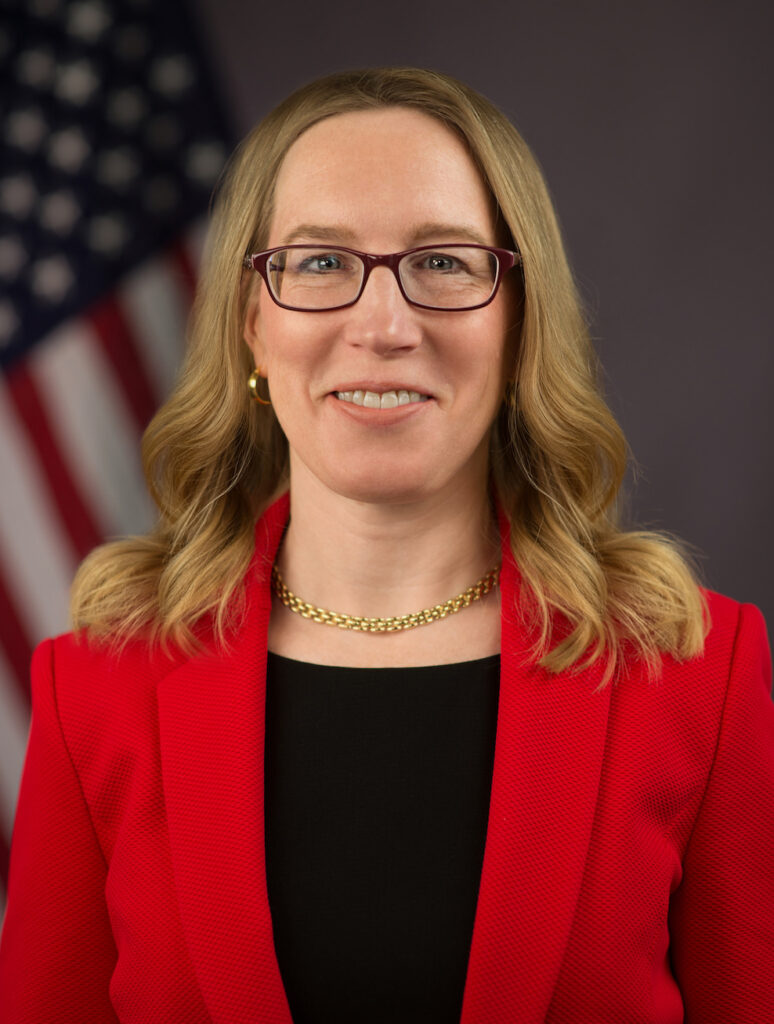SEC commissioner Hester Peirce this month accused top agency officials of creating a culture that has made it more difficult for the SEC to roll out new regulations and for registered companies to comply with them.
During Gary Gensler’s three years as chair, the SEC has developed a reputation for being less willing to respond to registrants’ questions, more defensive about new regulatory proposals, more likely to consider enforcement as a first option when presented with potential violations, and less effective overall at helping registrants comply with a flood of new regulations, Peirce said during an April 2 appearance at the annual, two-day SEC Speaks conference sponsored by the Practicing Law Institute (PLI).
“[T]he Commission discourages the staff from offering much more than silence, shrugs, sighs, and slow-walking,” she said. “The culture at the top of the SEC has changed, which in turn has changed the way the agency interacts with the public.”

The SEC is responsible for policing investment markets, but its ability to enforce regulations depends heavily on its ability to help registered companies figure out how to make sure innovative new products or services fit within rules that may refer indirectly or not at all to the specific function or asset class involved, she said.
Peirce has remarked several times about the potential for unfair levels of access inherent in the informal mix of public and individual discussions the agency conducts to help inform registrants on regulatory issues and answer specific questions.
During her last appearance at the SEC Speaks event in 2019, Peirce slammed the SEC under former chair Jay Clayton for the perception that the SEC favored some companies with guidance more than others by allowing them into an inner circle she referred to as a “secret garden.”
Gensler’s aggressive regulatory agenda has made the ability to provide such guidance even more critical by putting out so many complex new regulatory proposals that many investment companies are overwhelmed and unable to read and comment on new proposals, let alone find the resources to analyze new requirements and create effective implementation and compliance plans, she said.
“Much of the Commission’s day-to-day work does not and need not proceed through notice-and-comment rulemaking,” Peirce said. “People routinely approach the staff with questions about how the law applies to their unique facts and circumstances.”.
SEC staffers are as overworked as those of investment companies, she said, which makes it difficult for many to go the extra mile by answering complex questions from investment companies.
The agency under Gensler has pressured staffers to avoid or ignore questions, refuse to advise registered companies on the legality of plans or products they may be preparing to launch, and generally avoid being pinned down to any interpretation, advice or information that is not contained in an SEC publication like an alert or FAQ, even if those publications come too late to help innovative companies make more sense of the vague language of a regulation, she said.
Cold shoulder from the SEC
“Countless people have told me that they used to feel comfortable coming in and speaking with the Commission and its staff, but no more,” Peirce said. ”When it comes to interpretive guidance, “’The Commission is closed for business.’”
That impression is consistent with comments made to Fund Directions during the past two years by members of fund-board counsel and other sources who praise members of the SEC staff for their willingness to offer some hints on how examinations or enforcement staff are likely to interpret the language of a regulation.

It has been very difficult since Gensler’s appointment to get much useful guidance during one-on-one meetings with mid-level or senior SEC staff, according to an attorney who advises boards on issues related to M&A and new-business development.
SEC commissioners are more open to discussion during visits from leaders of industry associations, especially if they bring senior executives of investment advisers or members of a fund board along with them, according to two association representatives who discussed their interactions with the SEC anonymously and only in general terms.
“Some perceive meeting with the Commission is not only unproductive, but inadvisable,” Peirce said. “Sometimes people meet with me against the advice of counsel or only with counsel present. Other people have told me that they desperately want to have substantive discussions with the staff but worry that the inevitable result of such a meeting would be a call from enforcement, not a concerted effort to work through complex regulatory issues.”
Suspicion about enforcement
The current administration of the SEC has developed such a reputation for aggressive enforcement that fear of retribution has put a damper on the possibility of even mundane discussions between industry sources and regulators.
During a March 18 panel discussion at the Investment Company Institute’s Investment Management Conference in Palm Desert, Calif., for example, SEC Division of Investment Management deputy director Sarah ten Siethoff said that anyone who had trouble interpreting a particular rule should submit their questions to the SEC for possible inclusion in a future FAQ.
Ten Siethoff also endorsed the recommendation of enforcement officials that investment companies self-report any compliance violations they discover to reduce any potential repercussions by showing that the violation was unintentional and that remediation was underway.
“Please don’t,” said Dalia Blass, a former director of the DIM and current senior partner with Sullivan & Cromwell’s financial services group, interrupting ten Siethoff’s suggestion.
“When you take all your questions to the commission you are leaving room open for the commission, not commission staff, to amend something that was already adopted,” Blass said.
“It’s not necessary. There is a process for how these FAQs go through the building, and let me tell you: Do not engage with it,” Blass said. She supported other comments during the panel suggesting that investment companies asking questions are as likely to get a response in the form of an examination or enforcement action as useful guidance in solving a problem.
Promises of leniency are especially common in connection with the effort to enforce rules restricting the use of off-channel communications that has been a high priority for the enforcement division since late 2022, when the SEC announced it had fined 16 companies a total of $1.1bn for “pervasive” use of unmonitored communications.
The benefits of self-reporting are too inconsistent for attorneys to recommend it as a policy, according to a Skadden, Arps, Slate, Meagher and Flom LLP analysis posted Dec. 30, 2022.
More than a year after that report, SEC pleas that registrants self-report violations are even more common — but the justification for following that advice is just as thin, according to Amy Doberman, a partner at Wilmer Cutler Pickering Hale and Dorr LLP, who spoke on a panel during the same ICI conference as Blass and ten Siethoff’s panel.
“I haven’t seen situations where I think self-reporting really materially changes the outcome for the benefit of registrants,” Doberman said.
Trust issues broader than guidance
The trust problem between the SEC and the investment industry goes further than dissatisfaction with the balance between guidance and enforcement at the SEC, however, according to Investment Adviser Association president Karen Barr.
Industry associations have consistently objected to contradictions in the way the SEC describes the intentions of new rules and the language of the rules themselves, she said.
For example, the SEC described its recent AI rule proposal as a narrow effort to document the use of predictive analytics by investment advisers and make sure that AI-driven recommendations serve the interests of investors rather than advisers as required by fiduciary duty rules.
Critics argued, however, that the SEC’s description differed widely from the much broader language in the proposal itself, which the IAA has demanded be retracted and rewritten.
If the rule is designed to cover new risks more prevalent with artificial intelligence and machine learning it should do so, rather than relying on broad language that could put any digital system used by an investment adviser under threat, Barr said.
An SEC exam sweep of investment advisers addressed very cogent questions about the practical benefits of AI and its implications for data privacy, copyright, explainability, bias and other issues, but none of those issues are reflected in the rule proposal and the SEC won’t say why, Barr said shortly after a Q&A with Gensler during an IAA conference March 8. Gensler dodged Barr’s questions about the rule proposal and turned several around to rhetorically suggest Barr might favor AI that would slant results in favor of advisers rather than investors.
Defensiveness and rhetorical tricks are not admissions of guilt, but they do nothing to encourage companies regulated by the SEC to trust its intentions or its promises, according to Eric Pan, president of the ICI, who blasted Gensler and the SEC during the ICI conference in March for rulemaking that had gone beyond being simply troublesome and expensive for investment companies and actually become “harmful.”
Peirce did not go nearly that far in her condemnation of either Gensler or the SEC’s intentions, but did say the confusion, suspicion and difficulty of getting SEC staff to respond had created a level of distrust between the SEC and the companies it regulates.
The result is frustration and potentially lower returns for investment advisers, as well as a loss in the level of innovation from investment companies that want to color inside the lines with new products but can’t be sure where those lines really are, Peirce said. “Product ideas are abandoned before they are submitted to the Commission staff for consideration or after multi-year processes produce nothing but large legal bills and a loss of confidence in the Commission,” she said.
